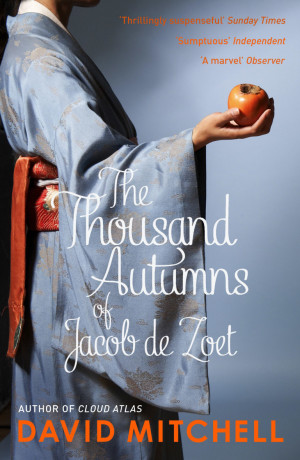British author David Mitchell is one of my absolute favourite contemporary writers and The Thousand Autumns of Jacob de Zoet is a superb novel. The writing is exquisite, the setting and historical background fascinating and the story riveting. A must read. The story is set at the end of the 18th century on Dejima, a sandbank in the bay of Nagasaki, Japan. A Dutch trading post and for two hundred years Japan’s only point of contact with the outside world. Clerk Jacob de Zoet is sent to Dejima by the Dutch East Indies Company to address a serious case of corruption.
Jacob, well educated and a devout Christian, is in for a shock as he boards the ship Shenandoah. First, the meeting with the crude, corrupt and cynical Dutch sailors and tradesmen, and later, the puzzling world of Dejima, with its mystifying codes of conduct, intrigues and gossip.
Two cultures meet on Dejima, one committed to Edo-era isolation, the other, driven by colonialism and greed, all against the backdrop of the ideas of Enlightenment and a Europe in upheaval. Suspicion rides high, but the locals’ hunger for knowledge and a glimpse of the outside world is intense, and deep friendships are formed despite the climate of distrust. Learning Japanese is illegal. Luggage is searched for Western objects, particularly religious artefacts and books. Interaction between the Dutch and the Japanese is discouraged, even illegal in some cases.
Mitchell creates a seething atmosphere of moral and monetary corruption, of suspicion and trust, a sort of Wild West of the east. Smugglers, interpreters, spies and thieves mingle; corruption on both sides is rampant. Relations between the Japanese and the Dutch are frosty, as illustrated by their meetings.
[…] Jacob notices a man seated three places the left of Magistrate Shiroyama. His face disturbs the clerk, though he could not say why; neither could Jacob guess his age. His shaven head and water-blue robes suggest a monk or even a confessor. The lips are tight, the cheekbones high, the nose hooked and the eyes ferocious with intelligence. Jacob finds himself as little able to evade the man’s gaze as a book can, of its own volition, evade the scrutiny of a reader. The silent observer twists his head, like a hunting dog listening to the sound of its prey.
Jacob, already betrothed to Anna back in Holland, falls secretly and illicitly in love with the mid-wife Orito. An educated girl from an elevated social class, Orito is granted exceptional access to Dejima to learn medicine from a Dutch doctor. Just as Jacob declares his love for her, Orito is sold off to a sinister cult whose male leader forcibly impregnates the imprisoned women. I will not reveal how it all ends; suffice to say that it is more than worth the ride.
The Thousand Autumns of Jacob de Zoet is a challenging read; Mitchell’s scope is ambitious, exposing two divergent cultures, the closed, insular of Japan and the expansive, colonial of Holland and the relative merits of isolation and trade. He draws on ideas from the Enlightenment, looks at faith versus science and emerging political thought.
Nevertheless, Mitchell writes with a lightness and elegance that makes this an exceptionally enjoyable and rewarding read. One of my absolute favourite novels and a perfect warm up to Mitchell’s much anticipated new book The Bone Clocks which is coming out in September. Can’t wait for that one!
The Thousand Autumns of Jacob de Zoet by David Mitchell published by Sceptre, 576 pages.





